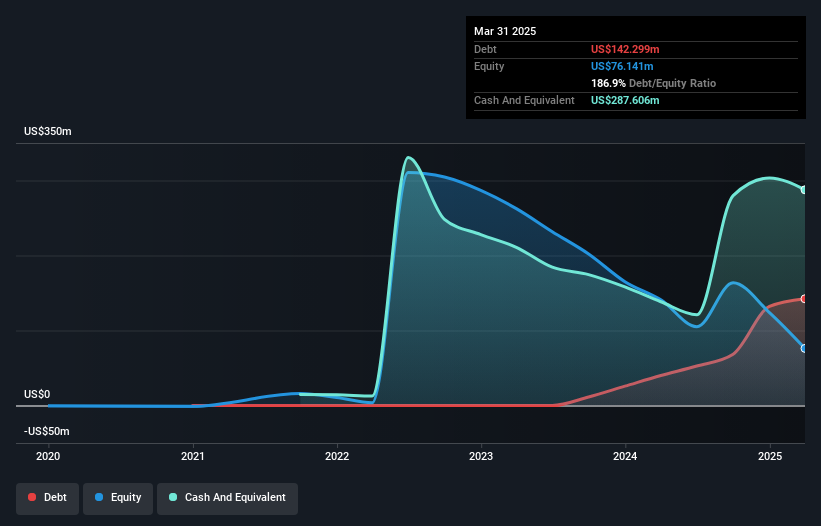
David Iben put it well when he said, 'Volatility is not a risk we care about. What we care about is avoiding the permanent loss of capital.' When we think about how risky a company is, we always like to look at its use of debt, since debt overload can lead to ruin. We can see that Eve Holding, Inc. (NYSE:EVEX) does use debt in its business. But is this debt a concern to shareholders?
When Is Debt A Problem?
Generally speaking, debt only becomes a real problem when a company can't easily pay it off, either by raising capital or with its own cash flow. In the worst case scenario, a company can go bankrupt if it cannot pay its creditors. However, a more usual (but still expensive) situation is where a company must dilute shareholders at a cheap share price simply to get debt under control. Of course, debt can be an important tool in businesses, particularly capital heavy businesses. The first thing to do when considering how much debt a business uses is to look at its cash and debt together.
How Much Debt Does Eve Holding Carry?
You can click the graphic below for the historical numbers, but it shows that as of March 2025 Eve Holding had US$142.3m of debt, an increase on US$40.0m, over one year. However, it does have US$287.6m in cash offsetting this, leading to net cash of US$145.3m.

A Look At Eve Holding's Liabilities
According to the last reported balance sheet, Eve Holding had liabilities of US$82.7m due within 12 months, and liabilities of US$145.4m due beyond 12 months. Offsetting these obligations, it had cash of US$287.6m as well as receivables valued at US$3.0k due within 12 months. So it can boast US$59.6m more liquid assets than total liabilities.
This short term liquidity is a sign that Eve Holding could probably pay off its debt with ease, as its balance sheet is far from stretched. Simply put, the fact that Eve Holding has more cash than debt is arguably a good indication that it can manage its debt safely. There's no doubt that we learn most about debt from the balance sheet. But it is future earnings, more than anything, that will determine Eve Holding's ability to maintain a healthy balance sheet going forward. So if you want to see what the professionals think, you might find this free report on analyst profit forecasts to be interesting.
Check out our latest analysis for Eve Holding
Given it has no significant operating revenue at the moment, shareholders will be hoping Eve Holding can make progress and gain better traction for the business, before it runs low on cash.
So How Risky Is Eve Holding?
We have no doubt that loss making companies are, in general, riskier than profitable ones. And in the last year Eve Holding had an earnings before interest and tax (EBIT) loss, truth be told. And over the same period it saw negative free cash outflow of US$131m and booked a US$162m accounting loss. However, it has net cash of US$145.3m, so it has a bit of time before it will need more capital. Even though its balance sheet seems sufficiently liquid, debt always makes us a little nervous if a company doesn't produce free cash flow regularly. There's no doubt that we learn most about debt from the balance sheet. However, not all investment risk resides within the balance sheet - far from it. Case in point: We've spotted 2 warning signs for Eve Holding you should be aware of, and 1 of them is significant.
When all is said and done, sometimes its easier to focus on companies that don't even need debt. Readers can access a list of growth stocks with zero net debt 100% free, right now.
Valuation is complex, but we're here to simplify it.
Discover if Eve Holding might be undervalued or overvalued with our detailed analysis, featuring fair value estimates, potential risks, dividends, insider trades, and its financial condition.
Access Free AnalysisHave feedback on this article? Concerned about the content? Get in touch with us directly. Alternatively, email editorial-team (at) simplywallst.com.
This article by Simply Wall St is general in nature. We provide commentary based on historical data and analyst forecasts only using an unbiased methodology and our articles are not intended to be financial advice. It does not constitute a recommendation to buy or sell any stock, and does not take account of your objectives, or your financial situation. We aim to bring you long-term focused analysis driven by fundamental data. Note that our analysis may not factor in the latest price-sensitive company announcements or qualitative material. Simply Wall St has no position in any stocks mentioned.
About NYSE:EVEX
Excellent balance sheet and slightly overvalued.
Market Insights
Community Narratives




